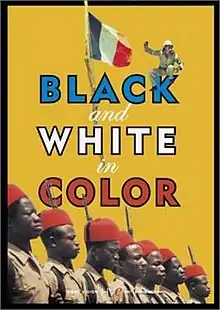| Black and White in Color | |
|---|---|
 | |
| Directed by | Jean-Jacques Annaud |
| Screenplay by | Georges Conchon |
| Story by | Jean-Jacques Annaud |
| Produced by | Arthur Cohn Jacques Perrin Giorgio Silvagni |
| Cinematography | Claude Augostini |
| Edited by | Françoise Bonnot |
| Music by | Pierre Bachelet |
Production companies | France 3 Cinéma Reggane Films Smart Film Produktion Société Française de Production (SFP) Société Ivoirienne de Cinema |
| Distributed by | Allied Artists (USA) |
Release date |
|
Running time | 90 minutes |
| Countries | France Ivory Coast |
| Language | French |
Black and White in Color (French: La Victoire en chantant, then Noirs et Blancs en couleur for the 1977 re-issue) is a French-Ivorian 1976 war film and black comedy directed by Jean-Jacques Annaud in his directorial debut. The film is set in the African theater of World War I, during the French invasion of the German colony of Kamerun. The film adopts a strong antimilitaristic point of view, and is noteworthy for ridiculing the French side even more harshly than their German counterparts.
The original French title is the first four words (the first line) of the song Le Chant du départ, a French military song.
It won the 1976 Academy Award for Best Foreign Language Film;[1] it was submitted to the Académie de Côte d'Ivoire, resulting in that country's first and only Oscar.
Plot
The film opens in 1915 in a remote French outpost located in the African colony of Cameroon. The French colonists, consisting of a small group of settlers, have been living a tranquil and isolated life, completely oblivious to the raging World War I happening far away in Europe. Their main preoccupation is maintaining a comfortable and leisurely existence.
One day, a French soldier named Gabriel Fouquet (played by Jean Carmet) arrives at the outpost, bringing the news of the war. The colonists, including the plantation owner De Sorgue (played by Jean Dufilho), his wife Lucie (played by Catherine Rouvel), and other colorful characters, are initially dismissive of the news, believing it to be irrelevant to their lives.
However, as the reality of the war begins to sink in, the French colonists decide to take action against the Germans, who are the colonial rulers in neighboring Togoland. They view it as an opportunity to demonstrate their patriotism and loyalty to France. The colonists gather their resources and organize a comical and misadventurous campaign against the Germans.
Led by De Sorgue and Sergeant Bosselet (played by Jacques Spiesser), the motley crew of colonists embarks on a journey through the African wilderness, encountering various obstacles and challenges along the way. They face not only the harsh conditions of the environment but also cultural clashes and misunderstandings as they interact with African tribes.
Despite their bumbling and amateurish attempts at war, the French colonists manage to cause some disruption to the Germans, leading to a series of humorous and unexpected situations. The film uses satire and irony to underscore the futility and absurdity of war and colonialism.
As the story unfolds, the colonists gradually come to realize the true nature of war and the complexities of the colonial system. The film juxtaposes the innocence and naivety of the colonists with the harsh realities of the conflict, challenging their romanticized notions of heroism and patriotism.
Cast
- Jean Carmet as Sergeant Bosselet
- Jacques Dufilho as Paul Rechampot
- Catherine Rouvel as Marinette
- Jacques Spiesser as Hubert Fresnoy
- Maurice Barrier as Caprice
- Benjamin Memel Atchory
Reception
John Simon described Black and White in Color as an "absolute gem".[2] Roger Ebert gave Black and White in Color three out of a possible four stars, writing- "is fun to watch and pointed in its comments on race and colonialism"[3] On review aggregator Rotten Tomatoes, the film holds an approval rating of 100% based on 6 reviews, with an average score of 7.7/10.[4]
See also
References
- ↑ "The 49th Academy Awards (1977) Nominees and Winners". Academy of Motion Picture Arts and Sciences. Retrieved 25 March 2012.
- ↑ Simon, John (2005). John Simon on Film: Criticism 1982-2001. Applause Books. p. 645.
- ↑ Black and White in Color
- ↑ "Black and White in Color - Rotten Tomatoes". www.rottentomatoes.com. Retrieved 9 May 2023.